Centrist Democrat International
The Centrist Democrat International (Spanish: Internacional Demócrata de Centro) is a Christian-democratic political international. Until 2001, it was known as the Christian Democrat International (CDI); before 1999, it was known as the Christian Democrat and People's Parties International. This earlier name is still sometimes used colloquially.
| Abbreviation | CDI (English), IDC (French, Spanish) |
|---|---|
| Formation | 30 July 1961[1] |
| Purpose | Christian democracy Social conservatism |
| Headquarters | Brussels, Belgium |
Region served | Worldwide |
Membership | 80 political parties |
Official languages |
|
Chairman | Andrés Pastrana Arango |
| Subsidiaries | Youth of the Centrist Democrat International |
| Affiliations | Christian Democrat Organization of America (ODCA) European People's Party (EPP) National Democratic Institute (NDI) |
| Website | idc-cdi.com |
| Part of a series on |
| Christian democracy |
|---|
 |
|
|
It is the primary international political group dedicated to promoting Christian democracy. Although it attracts parties from around the globe, its members are drawn principally from Europe and Latin America. Some are also members of the conservative International Democrat Union (IDU), although the CDI is closer to the European-conservative political centre and more communitarian than the IDU.
Overview
The CDI was formed in 1961 in Santiago, Chile, as the Christian Democrat World Union, building on the legacy of other Christian democrat internationals which were an alternative to the socialist internationals who tried to create a Christian-inspired third way. In 1999, it was renamed the Centrist Democrat International due to the participation of groups from other religions such as the Islamic National Awakening Party (PKB) of Indonesia.
The September 2001 leadership conference in Mexico City changed the organization's name to Centrist Democrat International, retaining its original CDI acronym. References to religion were not allowed in many Asian and African countries, and the CDI would not have been able to extend into Asia and Africa without a name change.[2]
The CDI's European division is the European People's Party, the largest European political party. Its American equivalent is the Christian Democrat Organization of America. The Democratic Party of the United States maintains links with the CDI through the National Democratic Institute.
Timeline
- December 1925: The first international gathering of Catholic-Christian democratic parties takes place in Paris, establishing the Secrétariat International des Partis Démocratiques d'Inspiration Chrétienne (SIPDIC). Member parties were from Belgium, Germany, Italy, France, the Netherlands, Luxembourg, Austria, Switzerland, Czechoslovakia, Hungary, Spain, Portugal, and Lithuania.
- 1939 to 1945: World War II suspends the SIPDIC.
- 23 April 1947: Political leaders from Argentina, Brazil, Chile, and Uruguay meet in Montevideo to create an international organization of Christian democratic parties. Representatives from Bolivia and Peru participate via diplomatic correspondence. The Declaration of Montevideo establishes the Organización Demócrata Cristiana de América (ODCA), although the name is not formalized until their second meeting in July 1949.
- 3 June 1947: European Christian Democrats form the Nouvelles Équipes Internationales (NEI) in Chaudfontaine, Belgium, prompted by the Swiss a year before restarting the SIPDIC. The NEI, open to non-Catholic parties who subscribed to the principles of social democracy, sees European integration as the best way to prevent the spread of communism into western Europe and encourages exile groups from Bulgaria, Romania, Lithuania, Hungary, Poland, Czechoslovakia, and Yugoslavia to attend. The NEI plays a significant role in preparations for the Hague Congress and the establishment of the European Coal and Steel Community.
- 26 July 1950: The Christian Democratic Union of Central Europe (CDUCE) is formed in New York City to assist Christian democratic parties in exile by organizing forces in opposition to communism. By 1955, it begins working with underground operatives in the Soviet bloc while trying to coordinate efforts between European and Latin American Christian Democratic parties.
- May and July 1956: The ODCA, NEI, and CDUCE meet for the first time in Paris at a gathering of 33 delegations from 28 countries to discuss the creation of a global Christian democratic organization.
- 1960: The three regional Christian democratic organizations establish the Christian Democratic International Information and Documentation Centre (CDI-IDC) in Rome to provide political analyses for Christian democratic parties around the world.
- 1961: The World Union of Christian Democrats (WUCD) is established in Santiago.
- 1982: The WUCD changes its name to the Christian Democrat International (CDI).
- 1999: The CDI changes its name to the Centrist Democrat International due to the increasing membership of non-Christian political parties. Since October 2000, some have informally referred to the CDI as the Christian Democrat and People's Parties International.
CDI member parties are generally members of the ODCA or the European People's Party (EPP, the successor of NEI).
Executive committee
The CDI executive committee consists of the president, executive secretary, and vice-presidents. The president is Andrés Pastrana Arango of Colombia and the executive secretary is MEP Antonio López-Istúriz of Spain.
Members of the executive committee are:
- Andrés Pastrana Arango (Colombia) – President
- Antonio López-Istúriz (Spain) – Executive Secretary
- César Maia (Brazil) – Vice-President
- Lourdes Flores Nano (Peru) – Vice-President
- Guillermo Lasso (Ecuador) – Vice-President
- Mariana Gómez del Campo (Mexico) – Vice-President
- Andrés Hernández (Cuba) – Vice-President
- Alberto Núñez Feijóo (Spain) – Vice-President
- Janez Janša (Slovenia) – Vice-President
- Viktor Orbán (Hungary) – Vice-President
- Andrej Plenković (Croatia) – Vice-President
- Elmar Brok (Germany) – Vice-President
- Yara Suos (Cambodia) – Vice-President
- Muhaimin Iskandar (Indonesia) – Vice-President
- Edgardo Angara (Philippines) – Vice-President
- Amine Gemayel (Lebanon) – Vice-President
- Adalberto Costa Jr. (Angola) – Vice-President
- Desirée Anne Ouloto (Ivory Coast) – Vice-President
- Nizar Baraka (Morocco) – Vice-President
- Pier Ferdinando Casini (Italy) – Honorary President
- José María Aznar (Spain) – Honorary President
- Ofelia Acevedo (Cuba) – Honorary Vice-President
- Mario David (Portugal) – Honorary Vice-President
- Ulisses Correia e Silva (Cape Verde) – Vice-President ex-officio
- Manfred Weber (Germany) – Vice-President ex officio
- Riccardo Pozzi (Italy) – Treasurer
Member parties
Former members
 Andorra – Andorran Democratic Centre
Andorra – Andorran Democratic Centre Andorra – New Centre (Catalan: Nou Centre, NC) (until 2011)
Andorra – New Centre (Catalan: Nou Centre, NC) (until 2011) Argentina – Justicialist Party (Spanish: Partido Justicialista, PJ) (until 2020s)
Argentina – Justicialist Party (Spanish: Partido Justicialista, PJ) (until 2020s).svg.png.webp) Belgium – Humanist Democratic Centre
Belgium – Humanist Democratic Centre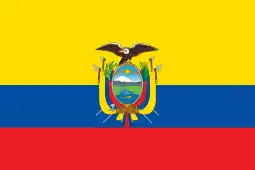 Ecuador – Christian Democratic Union
Ecuador – Christian Democratic Union Estonia – Pro Patria Union
Estonia – Pro Patria Union France – Union for a Popular Movement
France – Union for a Popular Movement Georgia – European Georgia — Movement for Liberty, EG) (until 2020s)
Georgia – European Georgia — Movement for Liberty, EG) (until 2020s) Hungary – Hungarian Democratic Forum
Hungary – Hungarian Democratic Forum Italy – Union of Democrats for Europe
Italy – Union of Democrats for Europe Slovakia – Slovak Democratic and Christian Union – Democratic Party
Slovakia – Slovak Democratic and Christian Union – Democratic Party Spain – Democratic Union of Catalonia
Spain – Democratic Union of Catalonia.svg.png.webp) Switzerland – Christian Democratic People's Party of Switzerland
Switzerland – Christian Democratic People's Party of Switzerland
Observer parties
The CDI has 9 observers, including:
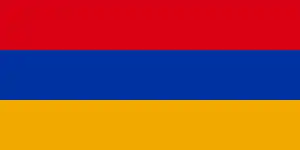 Armenia – Heritage (Armenian: Ժառանգություն)[6]
Armenia – Heritage (Armenian: Ժառանգություն)[6] Azerbaijan – New Azerbaijan Party (Azerbaijani: Yeni Azərbaycan Partiyası, YAP)[7]
Azerbaijan – New Azerbaijan Party (Azerbaijani: Yeni Azərbaycan Partiyası, YAP)[7]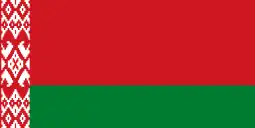 Belarus – Belarusian Christian Democracy (Belarusian: Беларуская хрысьціянская дэмакратыя, BKhD)
Belarus – Belarusian Christian Democracy (Belarusian: Беларуская хрысьціянская дэмакратыя, BKhD) Brazil – Brazilian Social Democracy Party (Brazilian Portuguese: Partido da Social Democracia Brasileira, PSDB)
Brazil – Brazilian Social Democracy Party (Brazilian Portuguese: Partido da Social Democracia Brasileira, PSDB)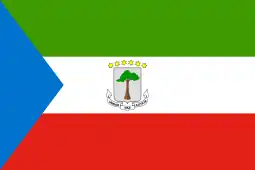 Equatorial Guinea – Popular Union of Equatorial Guinea (Spanish: Partido Unión Popular, PUP)
Equatorial Guinea – Popular Union of Equatorial Guinea (Spanish: Partido Unión Popular, PUP)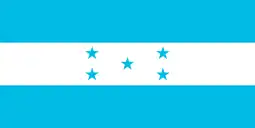 Honduras – National Party of Honduras (Spanish: Partido Nacional de Honduras, PNH)
Honduras – National Party of Honduras (Spanish: Partido Nacional de Honduras, PNH)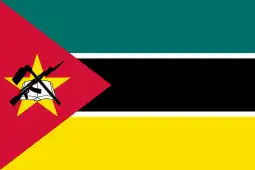 Mozambique – Mozambican National Resistance (Portuguese: Resistência Nacional Moçambicana, RENAMO)
Mozambique – Mozambican National Resistance (Portuguese: Resistência Nacional Moçambicana, RENAMO) Slovakia – Christian Democratic Movement (Slovak: Kresťanskodemokratické hnutie, KDH)
Slovakia – Christian Democratic Movement (Slovak: Kresťanskodemokratické hnutie, KDH)
See also
Notes
- Durand, Jean-Dominique, ed. (2015-01-01). Christian Democrat Internationalism. Peter Lang. p. 71. doi:10.3726/978-3-0352-6492-0. ISBN 978-3-0352-9924-3.
- Wilfried Martens (2008). Europe: I Struggle, I Overcome. Springer / Centre for European Studies. p. 220. ISBN 9783540892892.
- Safitri, Eva. "PKB Resmi Jadi Anggota Koalisi Partai Demokratis Internasional". detiknews.
- Parties, Centrist Democrat International, idc-cdi.com, retrieved 31 August 2016.
- "Conference of Centrist Democrat International held in Budapest". Daily News Hungary. 2018-02-17. Retrieved 2021-05-21.
- "The Heritage Party Has Become an Observer Member of Centrist Democrat International". www.heritage.am.
- "parties". IDC-CDI. Retrieved 15 August 2020.
Further reading
- Papini, Roberto (1997). The Christian Democrat International. Rowman & Littlefield Publishers.